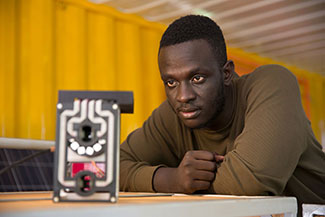Conducting ethical data science research in Africa
September / October 2020 | Volume 19, Number 5

Photo courtesy of Royal Academy of Engineering
Bold action from African governments will be required to fully
harness the potential of health data, according to Ugandan
tech entrepreneur Brian Gitta, a speaker at the Data Science in
Africa conference.
By Susan Scutti
Privacy, research subject consent and other issues pose major concerns for data science studies. The
Harnessing Data Science for Health Discovery and Innovation in Africa (DS-I Africa) project includes a component specifically to ensure the ethical, legal and social implications (ELSI) of data science research are an integral part of the initiative. In a panel discussion on the topic, the unique challenges were considered. “Whereas in most research projects, we are concerned about individual level interaction and data, data science often engages with big data, huge amounts of structured and non-structured data, that may have been captured with the active or non-active participation of the human subject,” explained the University of Maryland’s Dr. Clement Adebamowo. Because of this, the risks, benefits and burdens of data science may be distributed unevenly and inequitably across society. If scientists look more broadly at the challenges posed by both structured and unstructured data collection, “it does raise significant questions about consent and the scope and the applications of consent,” he said.
Data science poses inherent difficulties vis-à-vis participants and privacy, according to Pamela Andanda of the University of Witwatersrand. Technology disrupts the usual face-to-face interactions with patients; researchers instead engage with gadgets and unfamiliar data landscapes. “Data is always related to some human person. We need to consider the role of ethics in ensuring that individuals are respected,” she said. “We get their consent, but consent is not a once-off encounter. It’s an ongoing process.” This is further complicated by language differences and scientific literacy gaps, she noted. For instance, can consent be given in an African language that lacks a word for ‘genetics’?
The ethics of inherently unbalanced partnerships must also be considered. “We're in different stages of development, and resource allocation is not always equitable across the globe and also on the continent,” said Ananda. To ensure equitable partnerships among collaborating research institutions and researchers, it is necessary to embrace “custodial responsibilities,” where data sharing is facilitated, as opposed to an ownership mentality, she argued. Ananda’s ultimate strategy for integrating an ELSI framework into data science requires reflection on four values - honesty, care, respect and fairness. She believes a data scientist needs to take a few steps back at each stage of research and ask: "Am I being honest? Am I caring for people that are behind the data that I’m handling? Am I respectful? Am I fair in my dealings with other stakeholders?” Voluntary self-appraisal must be embraced throughout the lifespan of a project, because, “at the end of the day, it's individuals and institutions that will be at the forefront of integrating ELSI framework in data science research,” said Ananda.
Researchers have the obligation to describe potential risks and benefits for the entire community - not just study participants, said Dr. Josephine Agyeman-Duah of Oxford University. She said it is necessary “to empower the community, empower people, to understand the research, what we’re trying to do, how it will be of benefit to them and the implications - and also sensitize them so that they know when to speak out when people breach their rights.” Because data can be transferred and manipulated beyond the original study consented by participants, research subjects should have the right to withdraw at any point. She added that “withdrawing from research should not affect the rights that they have to medical care that they receive.”
Just as individuals need time to “really reflect” before providing consent, the continent needs to ponder its own participation and consent. “Are we ready in Africa to go big data, use big data?” asked Agyeman-Duah. “As Africans, we have to consider the sustainability of big data for us, the infrastructure, how are we setting it up? Do we have the capacity?” She observed that, within partnerships, those who lack ability or financial power “don't always have a voice.”
The NIH’s “embedded approach” means ethicists “are part and parcel of the research team,” helping to shape the agenda and co-design the research, said Oxford University’s Dr. Rosemary Musesengwa. By exploring implications early instead of waiting until problems arise, she said DSI-Africa projects can be conducted in a responsible, thoughtful, and inclusive manner.
More Information
To view Adobe PDF files,
download current, free accessible plug-ins from Adobe's website.
Related Fogarty Programs
Related World Regions / Countries
Related Global Health Research Topics